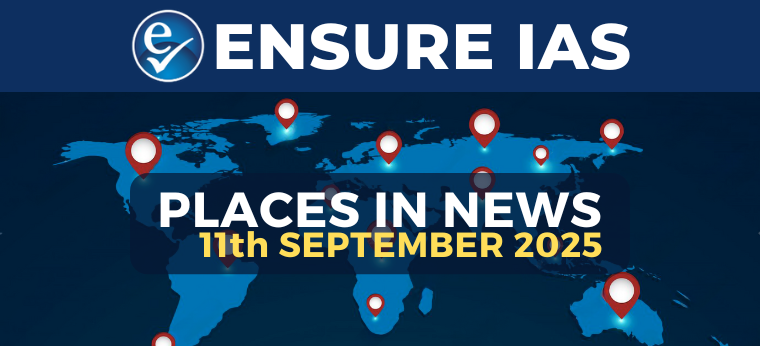Why in the News?
- The Government of India has brought into effect the Immigration and Foreigners Act, 2025, along with detailed Rules and Orders, effective from September 1, 2025.
- The new law represents a sweeping overhaul of India’s system for regulating the entry, stay, movement, and exit of foreign nationals, replacing several outdated and fragmented colonial-era laws.
- It also lays down exemptions for specific categories of foreigners, including refugees from minority communities in neighbouring countries, Tibetans, and Sri Lankan Tamils.
Key Highlights
- Consolidation of Old Laws
- Replaces four separate legislations:
- The Passport (Entry into India) Act, 1920
- The Registration of Foreigners Act, 1939
- Replaces four separate legislations:
- The Foreigners Act, 1946
- The Immigration (Carriers’ Liability) Act, 2000
- Brings all provisions relating to foreigners’ entry, stay, regulation, and exit under a single statute, making the framework more streamlined.
- Entry, Exit, and Documentation Rules
- Mandatory possession of valid passport and visa, except for exempted categories.
- Entry and exit allowed only through designated immigration posts (airports, seaports, land border points, and rail posts).
- Immigration officers given authority to approve or deny entry/exit on national security grounds.
- Registration and Reporting Obligations
- Registration with designated officers mandatory for foreigners.
- District SP/DCP made local civil authority; FRROs empowered with regional responsibilities.
- Hotels, hostels, PGs, and religious institutions must electronically report the arrival and departure of foreigners within 24 hours.
- Universities and hospitals must notify admission, treatment, births, and deaths of foreigners within 7 days.
- Regulation of Sensitive Areas and Institutions
- Special permits required for protected/restricted/prohibited areas, applied digitally.
- Civil authorities can shut down clubs, resorts, or establishments frequented by foreigners if linked to unlawful activities or posing security concerns.
- Exempted Categories of Foreigners
- Citizens of Nepal and Bhutan (with conditions).
- Tibetan refugees with registration certificates (especially pre-2003 entrants).
- Minority community refugees from Afghanistan, Pakistan, Bangladesh (Hindus, Sikhs, Buddhists, Jains, Parsis, Christians) entering before Dec 31, 2024.
- Sri Lankan Tamil refugees registered up to Jan 9, 2015.
- Holders of diplomatic/official passports and foreign military personnel under approved circumstances.
Implications
- Legal and Administrative Clarity
- Single statute eliminates fragmentation and overlapping provisions of earlier Acts.
- Reduces ambiguity between local and central authorities by centralising exemptions and enforcement.
- Strengthened National Security
- Immigration officers are empowered to deny entry on security grounds.
- Mandatory reporting by accommodation providers, hospitals, and universities creates real-time surveillance of foreign presence.
- Humanitarian Protections
- Special exemptions for refugees (Tibetans, Sri Lankan Tamils, minorities from neighbouring countries).
- Clear linkage with CAA, 2019 for minority community refugees, balancing humanitarian concerns with citizenship policy.
- Improved Enforcement and Digital Integration
- Digital records through portals/apps ensure timely and accurate information flow.
- Graduated fines (₹10,000 – ₹5 lakh) and compounding of offences reduce judicial burden and improve compliance.
- Foreign Relations and Mobility
- Visa-free and visa-on-arrival regimes aligned with bilateral agreements.
- Provides structured exemptions for foreign military and diplomatic personnel, enhancing international cooperation.
Challenges and Way Forward
| Challenges | Way Forward |
| Implementation burden: State police and FRROs may face staff and resource shortages in handling new digital and registration responsibilities. | Strengthen capacity building, training, and staffing of immigration and local authorities. |
| Digital divide and connectivity issues: Remote institutions (hospitals, hostels) may struggle with mandatory online reporting. | Create offline backup mechanisms and invest in last-mile digital infrastructure. |
| Risk of harassment/misuse: Mandatory reporting obligations for hotels and universities may cause inconvenience or misuse against genuine foreigners. | Introduce strict oversight, appeal mechanisms, and accountability measures for authorities. |
| Refugee integration gap: Exemptions do not automatically grant citizenship; many refugees may remain in limbo. | Provide a clear long-term roadmap for naturalisation and social integration. |
| Security vs. openness balance: Over-regulation may deter foreign students, tourists, and professionals. | Calibrate rules to ensure security without hampering India’s soft power and global attractiveness. |
Conclusion
The Immigration and Foreigners Act, 2025 marks a landmark reform in India’s immigration system, replacing outdated colonial laws with a modern, digital, and security-oriented framework. While it strengthens enforcement, centralises exemptions, and provides humanitarian safeguards for vulnerable groups, the success of the law will depend on balanced implementation, capacity-building at local levels, and ensuring that security concerns do not overshadow India’s global engagement and humanitarian commitments.
| Ensure IAS Mains Question Q. Discuss the key provisions of the Immigration and Foreigners Act, 2025. How does the Act seek to balance national security concerns with humanitarian obligations towards refugees? (250 words) |
| Ensure IAS Prelims Question Q. With reference to the Immigration and Foreigners Act, 2025, consider the following statements: 1. The Act consolidates and replaces four separate legislations, including the Foreigners Act, 1946 and the Passport (Entry into India) Act, 1920. 2. Citizens of Nepal and Bhutan are fully exempted from carrying passports or travel documents, regardless of their mode of entry. 3. The Act makes it mandatory for hotels, hostels, and accommodation providers to electronically notify authorities within 24 hours of the arrival and departure of every foreigner. Which of the above statements are correct? a) 1 and 3 only b) 2 and 3 only c) 1 and 2 only d) 1, 2 and 3 Answer: a) 1 and 3 only Explanation: Statement 1 is correct: The Act consolidates four older legislations (1920, 1939, 1946, 2000). Statement 2 is incorrect: Nepalese and Bhutanese citizens are exempt only for certain land and air routes, not for all entries (e.g., not via China, Hong Kong, Macau, or Pakistan). Statement 3 is correct: Accommodation providers must electronically report arrivals and departures of foreigners within 24 hours. |
Also Read | |
| UPSC Foundation Course | UPSC Daily Current Affairs |
| UPSC Monthly Magazine | CSAT Foundation Course |
| Free MCQs for UPSC Prelims | UPSC Test Series |
| ENSURE IAS NOTES | Our Booklist |





